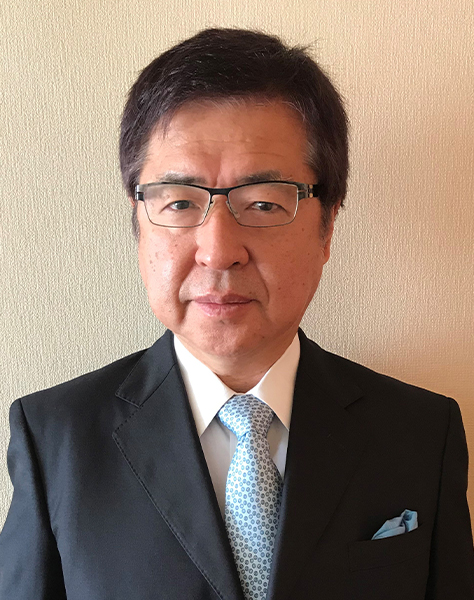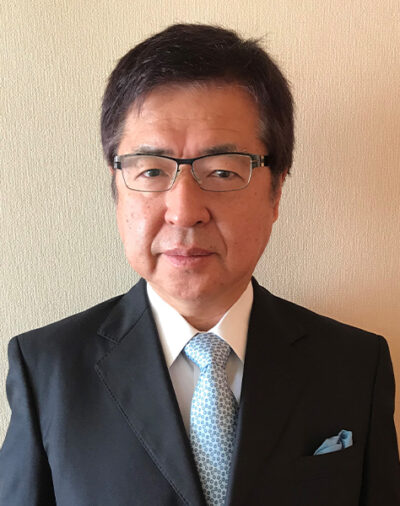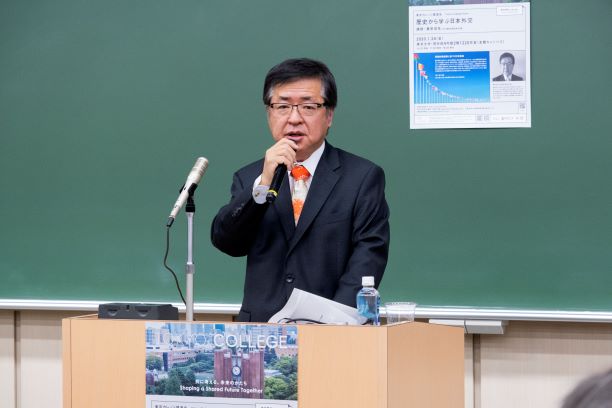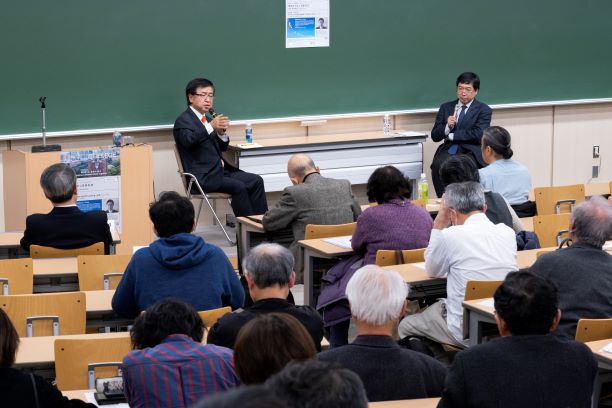Tokyo College Event “Japan’s grand strategy with historical perspective” by KANEHARA Nobukatsu, Former Assistant Chief Cabinet Secretary

Tokyo College held a public lecture on “Japan’s grand strategy with historical perspective”
On January 24, 2020, Mr. Nobukatsu Kanehara, former Assistant Chief Cabinet Secretary, gave a lecture on “Japan’s grand strategy with historical perspective.” Following introductory remarks from Professor Masashi Haneda (Tokyo College Director), Mr. Kanehara lectured on the following three themes relating to world history since the Industrial Revolution: power struggles and world war, colonial rule and racial discrimination, and totalitarianism and dictatorship. An explanation of universal values was given, with the activation of conscience (and the activation of a sense of conscientious obligation) keywords in relation to critical points in these three themes.
First of all, Mr. Kanehara introduced the discourse surrounding the Industrial Revolution, and the impact of the Industrial Revolution over the period of more than 200 years leading up to the present. Looking at the industrialization of Asia, which had been described as in a permanent state of stagnation after the Industrial Revolution, Mr. Kanehara pointed out that hardworking citizens with an enthusiasm for education inevitably bring about industrial revolution, and that Japan’s success is an example of that. The moral maturity of the human race as a whole also advanced together with the emerging consciousness of the unity of human society and of the earth, as industrialization progressed on a global scale. Looking back over this process, the lecture critically examined the course taken by Japan in the 20th century, and evaluated Japanese diplomacy, in the context of world history.
It is a premise of modern history that it was the handful of industrial nations after the Industrial Revolution of the late 17th century, the countries referred to now as advanced industrial democracies, that fundamentally rearranged the world order to create that of today. Mr. Kanehara stated that the universality of the values advocated by those countries, such as freedom, peace, democracy, and the rule of law, came to be recognized within modern international society, and provided a foundation for the liberal international order over a span of 200 years. In other words, it is only very recently that an international order based on liberalism or rules has spread globally.
Over the last 200 years, we have shared the experience of two world wars and colonial rule brought about by the earlier industrialized nations, as well as the cruelty and misery of racial discrimination on a global scale. Mr. Kanehara indicated that these problems were caused by power struggles and factional conflicts for domestic and international rank and leadership, and explained that the political thought and regime of each country have also had significant impacts on these problems. He stated that such circumstances have promoted the activation of conscience, leading to moral maturity, and universal values such as freedom, peace, democracy, and respect for the individual have come to be shared on a global scale. Mr. Kanehara referred to specific examples of countries and people (including Gandhi, Martin Luther King Jr., and Nelson Mandela) to explain the colonial rule and the activation of conscience.
Why did Japan choose war, where did it go wrong? Mr. Kanehara indicated that this was caused by the independence of Japan’s supreme command authority (the command authority of the military). He stated that it was a great mistake to have allowed the authority of the army to accumulate such that they could decide arbitrarily to follow Germany (Hitler) into war, and that the world (and Japan) would have been very different if the political, diplomatic, and military forces had been properly balanced.
Mr. Kanehara explained Japan’s mistakes and its current political system in more detail after the lecture, in a discussion with Professor Hideaki Shiroyama (University of Tokyo Graduate School of Law and Politics). He referred to problems associated with the fact that, together with the independence of the supreme command authority at the time of the Second World War, every ministry and agency became like its own sovereign state with the bureaucrats in each one having decision-making authority, and explained that a more fundamental investigation into political and diplomatic strategy will be required going forward, including the agendas of the mass media and the academic world. He suggested that, based on existentialism and Buddhist thought (the conscience), the existence of another self to look at oneself is important to both individuals and states.
In keeping with Mr. Kanehara’s statement that history is created through moral maturity and the activation of the conscience, the lecture inspired consideration of the current problems in international society, what the modern individual (the self) is, and what form society and politics should take in the future.
| Date(s) | Friday, 24 January 2020, 5:00-6:30 pm (Doors open: 4:30 pm) |
|---|---|
| Venue |
Room 1220, School of Science Building #4, the University of Tokyo (Hongo Campus) |
| Registration | Pre-registration required(180 seats - First come, first served) |
| Language | Japanese (No simultaneous translation available) |
| Organized by | Tokyo College, The University of Tokyo |
| Contact | tcevent@graffiti97.co.jp |

















